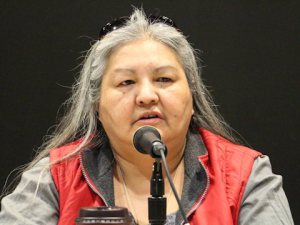If your only source of information is the mainstream news media you can be forgiven for wondering what the Idle No More movement is all about. Since it burst on the scene late last year, media attention has darted from demonstrations to blockades to the fasts of elders and chiefs — with an occasional sustained flurry of excitement when the PMO tried to smear Chief Theresa Spence.
Discussions of the abrogation of historic treaty rights or the corporate pillaging Stephen Harper has buried, like poisonous turds, in his omnibus budget bills, do not lend themselves to the tidy sound bites that nourish the media and feed the news cycle.
Having spent last Sunday afternoon at a panel discussion sponsored by Peace Alliance Winnipeg and Project Peacemakers, I can assure you that Idle No More is about nearly everything that is wrong with our society, but fundamentally it is about love. Love of family, friends, complete strangers, future generations, the air we breathe, the water we drink, the earth we walk on.
Idle No More is inclusive and green. As panelist Jerry Daniels puts it, “A sustainable future is important to not only aboriginal people, it is important to all of us … the issue is sustainable development — sustainable futures for our children.” For Leah Gazan, “it’s not just about Indigenous people of Canada any more, it’s about all of us. It’s about all of us sharing this land in a really good way.”
Idle No More is about redressing the damage we have done to ourselves and the environment, and preventing more of the same. Chickadee Richard sums it up in as tidy a sound bite as you could find anywhere: “As you heal, you heal Mother Earth.”
Idle No More is about aboriginal youth, says Michael Champagne, but about aboriginal youth unlike those of previous generations: “not only are we educated in Western institutions …, we are also educated by the Chickadees of the world, by our elders and our ancestors and our community and we are able to learn about the strength and resilience of our ancestors and our nations.”
Idle No More is about human solidarity. Champagne continues: “We’re able to hear those teachings within the medicine wheel and understand that we are all related regardless of the colour of our skin, and like a circle, it is not complete if one of you is missing … if you’re hurting, I’m hurting … and if I’m hurting, so are you … An injustice to one is an injustice to all.” Champagne was consistent; he included Stephen Harper in the company of those damaged by the system Idle No More seeks to overturn.
Idle No More cannot be contained or controlled says Lori Mainville. “The media poses a skewed version — always trying commodify or standardize or put it in a dichotomy and this is a people’s movement. The definition rests with the people and our relationship with the people, our allies, our brothers and sisters in each moment as this energy reveals itself. There’s no way you can cap [it].”
Idle No More is an obligation for those who love Mother Earth. “I guess you could say in … protecting the land, the waters, we’re your last resort,” says Jo Seenie Redsky. “I know the world is watching our people here, in the country of Canada, to see us rise up and protect what everybody needs to protect and that’s the land and the waters and those yet to come.”
At its base, says Redsky, Idle No More is about love. “There’s an unconditional love that we have for our kids. That protection that we have for them is the same protection that we need to have for Mother Earth.” For Lori Mainville, whatever the risks, “I keep remembering that the greatest equalizer is love … no fear, no surrender, only love … For me, it’s about love as a mother and a grandmother and a sister and a community member.”
You can watch a video of the Winnipeg Idle No More forum here.
Paul S. Graham is a professional communicator based in Winnipeg.



